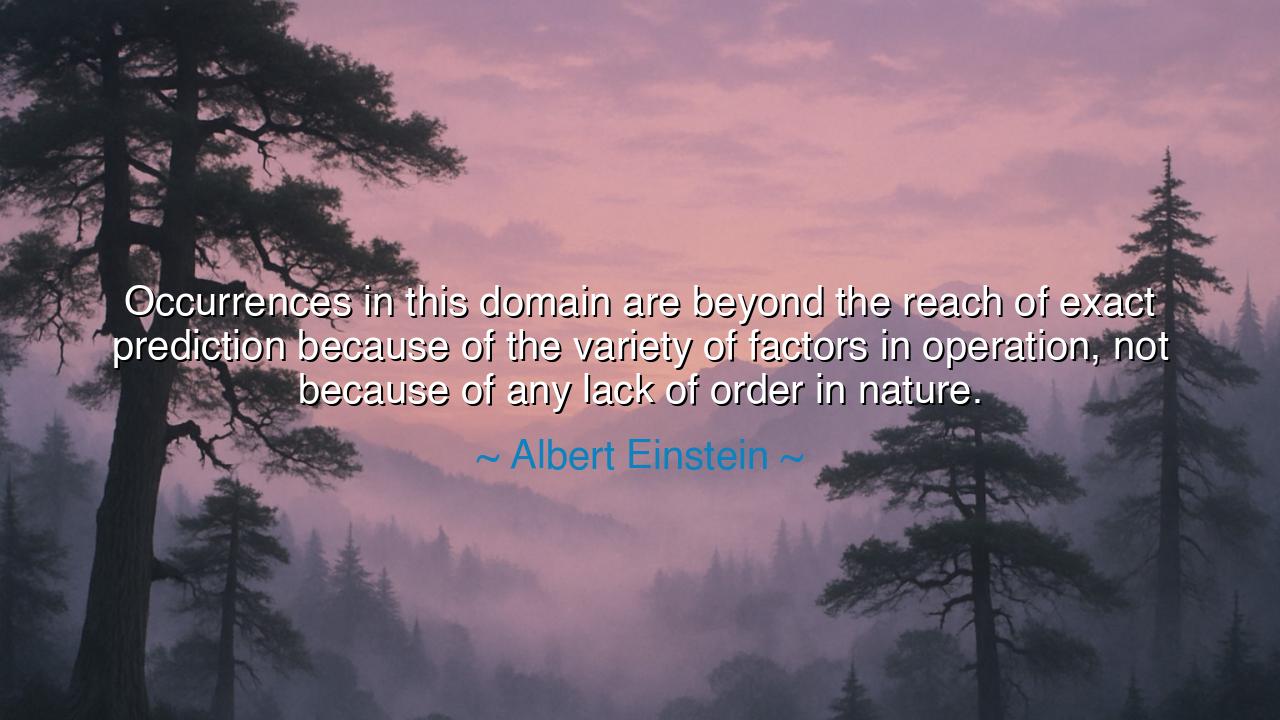
Occurrences in this domain are beyond the reach of exact
Occurrences in this domain are beyond the reach of exact prediction because of the variety of factors in operation, not because of any lack of order in nature.






Albert Einstein once proclaimed: “Occurrences in this domain are beyond the reach of exact prediction because of the variety of factors in operation, not because of any lack of order in nature.” In these words lies the wisdom of one who gazed into the very fabric of the cosmos. He reminds us that the universe is not chaos, though it may appear so to our limited eyes. The truth is subtler: the world is woven of countless threads, each pulling in its own direction, too many for the mind to trace in full. Yet though we cannot see every path, there is still order, vast and unshaken, hidden beneath the shifting surface.
The ancients would have understood this paradox. To them, the storm was not lawless, though it raged. The sea, with its restless tides, was not madness, though it thundered. They saw in all things the presence of order, even when human eyes could not foretell its course. So too does Einstein speak: when we fail to predict, it is not because nature is broken, but because our vision is small. What seems confusion is often simply complexity, too rich, too interwoven, for mortal calculation.
Consider the fall of Rome. Historians search for single causes: the greed of emperors, the weakness of armies, the pressure of barbarians. Yet in truth, it was the union of many factors—economic strain, cultural decay, shifting loyalties, and relentless invasions—that brought the empire to its knees. No man at the height of its glory could have predicted the exact year or moment of its fall. Yet was it chaos? No. There was order, but it was an order of complexity, not of simplicity. The collapse was not random, but the culmination of countless forces converging.
Einstein himself was speaking of the realm of physics, of particles and forces too subtle for exact reckoning. But his words reach further, into the soul of human life. How often do we despair when events defy our predictions? A friendship falters, a career shifts, a nation rises or falls. We call it chance, or fate, or misfortune. Yet the wise know: these are not the signs of disorder, but the outcome of many factors, hidden from our sight. The pattern is there, though we cannot yet read it.
The lesson is this: do not mistake your own blindness for the blindness of the universe. When your predictions fail, when events unfold in ways you could not foresee, remember that the fault lies not in the absence of order, but in the limits of human understanding. To cry “chaos!” is to insult the grandeur of nature, which even in its fiercest storms remains obedient to laws greater than ourselves.
Practical wisdom follows from this. In your own life, prepare not for exact prediction, but for resilience. When facing uncertainty, do not demand to know every outcome, but learn to adapt, to bend like the willow in the wind. Trust that the hidden order of things is at work, even when you cannot see the shape of its design. Study diligently, act wisely, but hold lightly to your forecasts, for the universe is larger than your plans.
Thus, Einstein’s words shine like a lantern for all seekers: “Occurrences… are beyond the reach of exact prediction… not because of lack of order in nature.” Let us walk with humility, recognizing that what appears uncertain to us is not uncertain to the universe. Let us act with courage, knowing that beneath the countless factors, there is still a harmony that binds the stars, the earth, and the beating of our own hearts. And in this recognition, we shall find peace: for though we cannot foresee all things, we may trust that all things are held in an eternal order.






AAdministratorAdministrator
Welcome, honored guests. Please leave a comment, we will respond soon